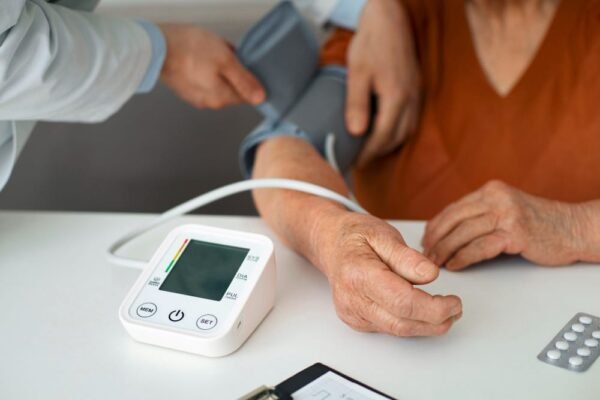High blood pressure, or hypertension, is a common condition with serious health problems. It is broadly classified into two types: primary (essential) hypertension and secondary hypertension. Understanding these differences is crucial for effective management and treatment. Blood Pressure Explained: Diagnosis, Treatment, and Management
Primary Hypertension
90–95% of hypertension cases come under primary hypertension. Its exact cause is often unknown, but it’s linked to:
- Genetics: If your family has a history of hypertension, it may increase the risk that you can also occur with the same.
- Lifestyle Factors: It also depends on your lifestyle if you have a poor diet. Lack of exercise at the gym and high sodium intake can also increase the risk of hypertension.
- Age and Race: The risk may increase with developing age, and certain cultural groups are more affected.
Secondary Hypertension
Secondary hypertension refers to high blood pressure that is caused by an underlying medical condition or factor. This is in contrast to primary hypertension, which is high blood pressure without a known cause.
- Kidney Disease: Impaired kidney function can elevate blood pressure.
- Hormonal Disorders: Conditions like Cushing’s syndrome or hyperthyroidism.
- Medications: Birth control pills, decongestants, and NSAIDs can contribute.

Diagnosis and Treatment
Diagnosis often involves blood pressure monitoring and tests to identify underlying conditions. Treatment varies:
- Primary hypertension: lifestyle changes and medication.
- Secondary Hypertension: Treat the underlying cause and possibly use antihypertensive drugs.
2. The Role of Potassium in Blood Pressure Regulation: How Much Do You Need?
Potassium plays a vital role in maintaining normal blood pressure by balancing sodium levels in the body. Insufficient potassium intake can contribute to hypertension.
How Potassium Regulates Blood Pressure
- Balances Sodium Levels: Potassium helps kidneys excrete excess sodium, reducing blood pressure.
- Supports Heart Function: It maintains proper heart muscle contraction and overall cardiovascular health.
Recommended Daily Intake
The recommended daily potassium intake is 3,500-4,700 mg for adults.
Potassium-Rich Foods
Incorporate these into your diet:
- Bananas
- Potatoes (with skin)
- Spinach and kale
- Beans and lentils
Risks of Too Much Potassium
Excess potassium (hyperkalemia) can cause complications, especially in people with kidney disease. Always consult a healthcare provider.
3. Whitecoat Hypertension: Causes, Risks, and Management Strategies
White coat hypertension refers to elevated blood pressure readings in medical settings, often caused by anxiety. It’s crucial to distinguish this condition from sustained hypertension.
Causes
- Anxiety in Clinical Settings: Stress during medical appointments.
- Fear of Diagnoses: Worry about health outcomes.
Risks
- If persistent, white-coat hypertension may indicate an increased risk of sustained hypertension.
- It can lead to unnecessary medication if misdiagnosed.
Management
- Home Monitoring: Use validated blood pressure monitors.
- 24-Hour Ambulatory Monitoring: Provides a comprehensive picture of blood pressure throughout the day.
- Stress-Reduction Techniques: Breathing exercises and mindfulness.
4. The Connection Between Sleep Apnea and High Blood Pressure
Sleep apnea, a disorder characterized by interrupted breathing during sleep, is closely linked to hypertension. Untreated sleep apnea increases the risk of cardiovascular complications.
How Sleep Apnea Affects Blood Pressure
- Interrupted oxygen flow: causes the body to release stress hormones, raising blood pressure.
- Nighttime Hypertension: Sleep apnea disrupts natural blood pressure dips during sleep.
Symptoms
- Loud snoring
- Daytime fatigue
- Morning headaches
Treatment Options
- CPAP Machines: Help maintain airway pressure.
- Lifestyle Changes: weight loss, quitting smoking, and reducing alcohol intake.
- Oral appliances: prevent airway collapse during sleep.
5. Natural Supplements and Herbs for Blood Pressure Management: What Works?
Natural supplements and herbs can complement lifestyle changes in managing blood pressure. However, they should be used cautiously under medical supervision.
Effective Natural Options
- Garlic Extract: Contains allicin, which supports blood vessel relaxation.
- Omega-3 fatty acids, found in fish oil, reduce inflammation and support heart health.
- Magnesium: Relaxes blood vessels and regulates heartbeat.
- Hibiscus Tea: Contains compounds that lower systolic and diastolic pressure.
Cautionary Notes
- Always consult a healthcare provider before starting supplements.
- Ensure compatibility with existing medications.
Conclusion
Natural remedies can be effective but are not a replacement for medical treatment or lifestyle changes. Regular monitoring and professional guidance are essential.





